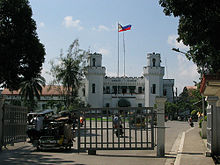
Surprisingly, the precinct was not in a sleepy town or remote area, but within the notorious national penitentiary.
What many had expected to be a riotous “historic moment” at the first special polling place at the New Bilibid Prison (NBP) in Muntinlupa City turned out to be a long quiet wait due to a three-hour delay in the delivery of the voting paraphernalia.
Elections Commissioner Luie Guia, who had come to observe the proceedings with Justice Secretary Leila de Lima, said that election lawyers at the NBP special polling place’s mother precinct at the nearby Itaas Elementary School in Muntinlupa had refused to release the voting paraphernalia.
“(They) apparently did not understand the procedures, and that Comelec Resolution 9371 released last year allows detainee voting. It has been done since 2010,” Guia said.
In 2010, only detainees at city or provincial jails were allowed to vote since their cases had yet to be resolved. In the same vein, De Lima said, only Bilibid inmates with cases on appeal and whose conviction “have not attained finality” were allowed to vote.
Of the NBP’s 22,000 inmates, only 1,985 were allowed to vote, 191 from the medium security compound and 1,794 from the maximum security section.
Election offense
Had the lawyers at the Itaas Elementary School persisted on holding up the delivery of the ballots, “they could have been arrested,” De Lima said. “If one delays the delivery of election paraphernalia, that’s an election offense.”
“When I was with the Commission on Human Rights in 2008, I advocated for detainee voting. We identified detainees as one of six vulnerable sectors, prone to being disenfranchised,” she explained.
The misunderstanding on detainee voting was apparently cleared through the intercession of Guia and Bureau of Corrections (BuCor) officials. The voting paraphernalia started arriving at around 10 a.m. and actual voting started some 20 minutes later.
The voter-inmates at NBP, who registered in October last year as Muntinlupa residents, had been prepped at the holding center and polling place at the NBP administration building as early as 6 a.m.
So were the more than 40 Special Board of Election Inspectors (SBEI), volunteer-teachers from nearby schools, who were hoping to cast their own votes in their own voting precincts later in the day.
By the time the ballots arrived, the voter-inmates had started nodding off in their chairs.
For nonvoting inmates, however, Monday was anything but quiet, according to Manny Tolentino of the Parish Pastoral Council for Responsible Voting (PPCRV), who was monitoring the NBP elections.
The nonvoting inmates “grew angrier” as the voting hours drew on, he said, because of the “padlocked status” imposed on the three security compounds in the NBP, which meant that visitation rights were suspended and inmates were kept in their cells.
Despite the delay, the first Bilibid special polls were neat and orderly, with no campaign flyers littering the converted gym. Inmates were quietly ushered in in batches of 10 to 15, while illiterate inmates were tagged accordingly and assisted by the SBEIs.
BuCor Public Information Officer Supt. Antonio Cruz said a total of 2,511 inmates voted in BuCor-run penal colonies nationwide, including 36 at the San Ramon Penal Farm, 117 in Leyte and 373 in Davao.—Jaymee T. Gamil

